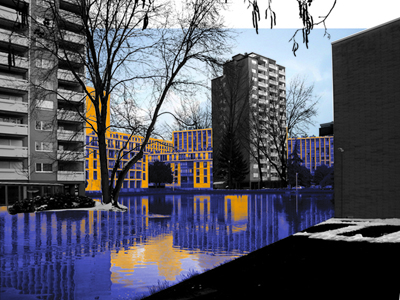
Beim Engagement für einen sparsamen Umgang mit Ressourcen und für den Schutz unserer Lebenswelt kommen Architektur und Städtebau eine wichtige Rolle zu. Mit ihrem Anspruch, feste, schützende und identifikationsstiftende Orte zu schaffen, sind sie das menschliche Instrument der Nachhaltigkeit schlechthin.
Eine unserer kostbarsten und wichtigsten Ressourcen ist die Landschaft. Man kann nur aufhören, sie zu konsumieren, indem man aufhört, neues Bauland auszuweisen. Für die europäische Stadt ist das nicht nur möglich, sondern notwendig. Unsere Bevölkerung stagniert, und die auf die Migrationsbewegungen und das Anwachsen der individuellen Standards zurückgehenden Anpassungen können stattfinden, indem die bereits urbanisierten Gebiete besser genutzt werden. Das würde zudem der Effizienz der Infrastrukturen und der Intensität des städtischen Lebens zum Vorteil gereichen.
Doch wenn es sich schon als notwendig erweist, Neubauten zu errichten, sollten diese so entworfen und konstruiert werden, dass sie möglichst umweltschonend ausfallen. Und dazu gehört, dass sie möglichst lange halten. Noch fördern der Grundstücksmarkt und die Abschreibungsmechanismen in den kapitalistischen Ländern die rasche Folge von Abriss und Neubau. Doch das ist ökologisch unverantwortlich, volkswirtschaftlich inakzeptabel und wird hoffentlich bald auch privatökonomisch nicht mehr bestehen können.
Architektur und Stadt können keine Wegwerfprodukte sein; sie müssen dauern. Und zwar nicht nur physisch, sondern auch ästhetisch. Unsere Häuser, unsere Städte dürfen nicht wie modische Objekte gestaltet sein, dem gerade gültigen Geschmack bedingungslos untergeordnet und darauf ausgerichtet, eben eine Saison zu halten, um dann von neuen, noch modischeren Objekten ersetzt zu werden. Sie müssen eine Ästhetik ihr eigen nennen, die zwar dem Geist ihrer Epoche entspringt, zugleich aber an die Vergangenheit anknüpft und in die Zukunft weist.
Vittorio Magnago Lampugnani, Professor für Geschichte des Städtebaus, Institut für Städtebau.